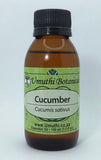Carrier Oil: Cucumber
General Information:
- Botanical Name: Cucumis sativus
- Family: Cucurbitaceae
- Extraction Method: Cold-pressing or maceration of cucumber seeds in a carrier oil, such as sunflower oil or olive oil.
- Plant Part: Seeds or Fruit
- Origin: Believed to be native to India or Western Asia
Appearance and Aroma:
- Color: Light yellow to greenish
- Consistency: Lightweight and smooth
- Aroma: Mild, fresh, and reminiscent of cucumbers
Properties and Characteristics:
- Texture: Cucumber oil has a light and non-greasy texture that absorbs well into the skin.
- Nutritional Profile: It is rich in vitamins, minerals, and antioxidants, such as vitamin C and caffeic acid.
- Shelf Life: The shelf life of cucumber oil depends on the carrier oil used. Typically, it can last up to 6 to 12 months when stored properly in a cool, dark place.
Uses and Benefits:
- Skin Care: Cucumber oil is known for its hydrating, soothing, and cooling properties. It helps moisturize and calm the skin, reduce inflammation, and improve skin tone and elasticity. It can be used in facial serums, creams, lotions, and under-eye products.
- Eye Care: Cucumber oil is often used to reduce puffiness and dark circles around the eyes. It can be applied topically or as an ingredient in eye creams and gels.
- Massage Oil: Cucumber oil can be used in massage oils for its refreshing and skin-nourishing effects.
- Hair Care: Cucumber oil can help condition and moisturize the hair, promoting a healthy scalp and adding shine to the hair. It can be used in hair oils, masks, and serums.
Safety Precautions:
- Cucumber oil is generally safe for topical use. However, if you have any known allergies to cucumbers or related plants, consult a healthcare professional before using cucumber oil.
Note: This information is provided for educational purposes only and is not intended to diagnose, treat, cure, or prevent any disease. Consult a healthcare professional or certified aromatherapist for personalized advice and guidance.




